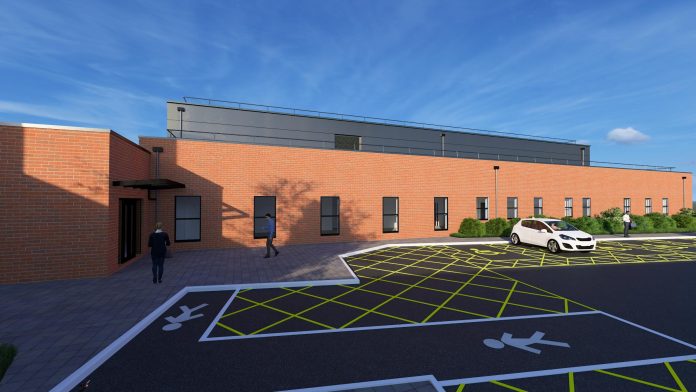Following a decision by Ashfield District Council at its recent Planning Committee, Sherwood Forest Hospitals announces that planning approval has been granted for a new purpose-designed Magnetic Resonance Imaging (MRI) building at King’s Mill Hospital.
Enabling works will now be carried out at the site, with work due to start immediately on this crucial project, which is being funded by NHS England. The new build, designed by international architects CPMG, is expected to be fully operational in early 2026.
The Radiology team at Sherwood Forest Hospitals has been involved in the design process from the very beginning, and Sarah Sentance, Radiography Services Manager, said:
“It will transform the MRI service for the Trust, particularly from a patient experience perspective.
“All of my team are really excited to be able to offer our patients this amazing facility.”
The new build at King’s Mill Hospital will have accommodation on the ground floor for three scanners. A second storey will incorporate the plant, IT, and electrical service rooms. It will adjoin the main hospital, providing easy access for both patients and staff.
Demand for scans has reached the stage where patient need now exceeds capacity, and the current mobile scanners are regularly in operation for over 12 hours per day, seven days a week. The existing static scanner at King’s Mill Hospital is more than 12 years old, has exceeded its life expectancy, and has become increasingly unreliable.
Adam Littler, Divisional General Manager, Clinical Support, Therapies & Outpatients Division, said:
“We will be able to deliver about 15,000 scans per year.
“We are putting two scanners in from the beginning, but there is room for three, allowing us to meet ongoing demand for our most critical patients, which is a really important step.”
This innovative scheme will provide state-of-the-art scanners, guaranteeing more efficient and increased capacity for inpatients as well as complex elective cases—specifically those patients on an urgent suspected cancer pathway—meaning patients will be seen more quickly and receive their diagnosis sooner.
Getting a rapid diagnosis for conditions such as cancer means patients can access the treatments they need more quickly—something that could be genuinely lifesaving, as earlier diagnosis is the key to improving survival rates and quality of life for those suffering from chronic diseases.
Magnetic Resonance Imaging (MRI) is a medical imaging technique used in radiology that employs strong magnetic field gradients and radio waves to form detailed images of the inside of the body. It is used to investigate and diagnose conditions that affect soft tissues, such as tumours (including cancer), and soft tissue injuries, such as damaged ligaments, joint injuries, and diseases.









